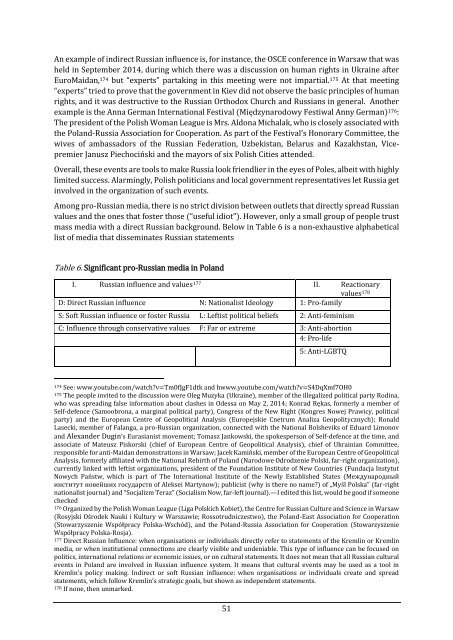to Central Europe
PC_reactionary_values_CEE_20160727
PC_reactionary_values_CEE_20160727
Create successful ePaper yourself
Turn your PDF publications into a flip-book with our unique Google optimized e-Paper software.
An example of indirect Russian influence is, for instance, the OSCE conference in Warsaw that was<br />
held in September 2014, during which there was a discussion on human rights in Ukraine after<br />
EuroMaidan, 174 but “experts” partaking in this meeting were not impartial. 175 At that meeting<br />
“experts” tried <strong>to</strong> prove that the government in Kiev did not observe the basic principles of human<br />
rights, and it was destructive <strong>to</strong> the Russian Orthodox Church and Russians in general. Another<br />
example is the Anna German International Festival (Międzynarodowy Festiwal Anny German) 176 :<br />
The president of the Polish Woman League is Mrs. Aldona Michalak, who is closely associated with<br />
the Poland-Russia Association for Cooperation. As part of the Festival’s Honorary Committee, the<br />
wives of ambassadors of the Russian Federation, Uzbekistan, Belarus and Kazakhstan, Vicepremier<br />
Janusz Piechociński and the mayors of six Polish Cities attended.<br />
Overall, these events are <strong>to</strong>ols <strong>to</strong> make Russia look friendlier in the eyes of Poles, albeit with highly<br />
limited success. Alarmingly, Polish politicians and local government representatives let Russia get<br />
involved in the organization of such events.<br />
Among pro-Russian media, there is no strict division between outlets that directly spread Russian<br />
values and the ones that foster those (“useful idiot”). However, only a small group of people trust<br />
mass media with a direct Russian background. Below in Table 6 is a non-exhaustive alphabetical<br />
list of media that disseminates Russian statements<br />
Table 6. Significant pro-Russian media in Poland<br />
I. Russian influence and values 177 II. Reactionary<br />
values 178<br />
D: Direct Russian influence N: Nationalist Ideology 1: Pro-family<br />
S: Soft Russian influence or foster Russia L: Leftist political beliefs 2: Anti-feminism<br />
C: Influence through conservative values F: Far or extreme 3: Anti-abortion<br />
4: Pro-life<br />
5: Anti-LGBTQ<br />
174 See: www.youtube.com/watch?v=Tm0fJgF1dtk and hwww.youtube.com/watch?v=S4DqXmf7OH0<br />
175 The people invited <strong>to</strong> the discussion were Oleg Muzyka (Ukraine), member of the illegalized political party Rodina,<br />
who was spreading false information about clashes in Odessa on May 2, 2014; Konrad Rękas, formerly a member of<br />
Self-defence (Samoobrona, a marginal political party), Congress of the New Right (Kongres Nowej Prawicy, political<br />
party) and the <strong>Europe</strong>an Centre of Geopolitical Analysis (<strong>Europe</strong>jskie Cnetrum Analiza Geopolitycznych); Ronald<br />
Lasecki, member of Falanga, a pro-Russian organization, connected with the National Bolsheviks of Eduard Limonov<br />
and Alexander Dugin’s Eurasianist movement; Tomasz Jankowski, the spokesperson of Self-defence at the time, and<br />
associate of Mateusz Piskorski (chief of <strong>Europe</strong>an Centre of Geopolitical Analysis), chief of Ukrainian Committee,<br />
responsible for anti-Maidan demonstrations in Warsaw; Jacek Kamiński, member of the <strong>Europe</strong>an Centre of Geopolitical<br />
Analysis, formerly affiliated with the National Rebirth of Poland (Narodowe Odrodzenie Polski, far-right organization),<br />
currently linked with leftist organizations, president of the Foundation Institute of New Countries (Fundacja Instytut<br />
Nowych Państw, which is part of The International Institute of the Newly Established States (Международный<br />
институт новейших государств of Aleksei Martynow); publicist (why is there no name?) of „Myśl Polska” (far-right<br />
nationalist journal) and “Socjalizm Teraz” (Socialism Now, far-left journal).—I edited this list, would be good if someone<br />
checked<br />
176 Organized by the Polish Woman League (Liga Polskich Kobiet), the Centre for Russian Culture and Science in Warsaw<br />
(Rosyjski Ośrodek Nauki i Kultury w Warszawie; Rossotrudniczestwo), the Poland-East Association for Cooperation<br />
(S<strong>to</strong>warzyszenie Współpracy Polska-Wschód), and the Poland-Russia Association for Cooperation (S<strong>to</strong>warzyszenie<br />
Współpracy Polska-Rosja).<br />
177 Direct Russian Influence: when organisations or individuals directly refer <strong>to</strong> statements of the Kremlin or Kremlin<br />
media, or when institutional connections are clearly visible and undeniable. This type of influence can be focused on<br />
politics, international relations or economic issues, or on cultural statements. It does not mean that all Russian cultural<br />
events in Poland are involved in Russian influence system. It means that cultural events may be used as a <strong>to</strong>ol in<br />
Kremlin's policy making. Indirect or soft Russian influence: when organisations or individuals create and spread<br />
statements, which follow Kremlin’s strategic goals, but shown as independent statements.<br />
178 If none, then unmarked.<br />
51


